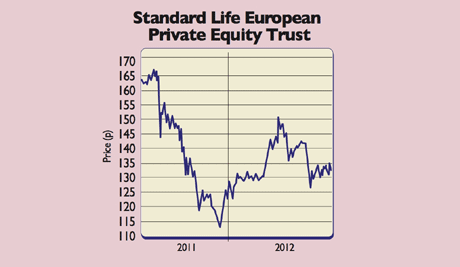Grab a slice of big private-equity deals
Private-equity investment trusts (PEITs) have made impressive returns in recent years. James McKeigue explains how they work - and tips one trust for the adventurous investor.

Get the latest financial news, insights and expert analysis from our award-winning MoneyWeek team, to help you understand what really matters when it comes to your finances.
You are now subscribed
Your newsletter sign-up was successful
Want to add more newsletters?

Twice daily
MoneyWeek
Get the latest financial news, insights and expert analysis from our award-winning MoneyWeek team, to help you understand what really matters when it comes to your finances.

Four times a week
Look After My Bills
Sign up to our free money-saving newsletter, filled with the latest news and expert advice to help you find the best tips and deals for managing your bills. Start saving today!
When American private-equity giant KKR bought British pharmacy Alliance Boots in 2007, the $11.7bn deal was Europe's largest leveraged buy-out. Critics thought KKR would fail to make a decent return. But five years later KKR has proved the doubters wrong.
Last month it resold a chunk of Boots to an American pharmacy, almost tripling its original investment. While these mega deals are out of reach for most of us, there is a way that retail investors can get involved in the sector, via private-equity investment trusts (PEITs). But should you do so?
PEITs are listed companies that invest in unlisted firms. Some invest directly and buy holdings in private companies, while others reinvest your money in other private-equity funds. Their long-term record is pretty impressive. For example, over the last 15 years the average price of a PEIT has risen 230% compared to 123% for the FTSE All-Share, says Investors Chronicle.
MoneyWeek
Subscribe to MoneyWeek today and get your first six magazine issues absolutely FREE

Sign up to Money Morning
Don't miss the latest investment and personal finances news, market analysis, plus money-saving tips with our free twice-daily newsletter
Don't miss the latest investment and personal finances news, market analysis, plus money-saving tips with our free twice-daily newsletter
In America, a recent study found that the average private-equity fund outperformed the S&P 500 by 20% to 27% over the life of the fund. However, those statistics hide some volatility.
Many funds borrowed heavily to buy stakes in other firms and got duly hammered when credit dried up a few years ago. As a result, a lot of PEITs look cheap now. Quite a few are trading at a 30% discount to the value of the assets they hold, says Leonora Walters in Investors Chronicle. That compares to a pre-crisis average discount of 5% to 10%.
In some ways the sell-off looks overdone. Many PEITs have improved their finances and paid off lots of debt. Moreover, the better ones have been able to take advantage of the downturn and falling asset prices to pick up distressed firms on the cheap. But a PEIT's share price will only rise once investors are confident it can make a profit by selling on its assets and in the current climate that's pretty tough.
The initial public offering market is stalling and wasn't helped by Facebook's share price flop. Aim, the main market for small companies in Britain, has only seen £1.63bn of listings so far this year. That's down on the £4bn total in 2011, which was itself a bad year. Meanwhile, Plus, a market for even smaller companies, announced its closure earlier this year.

So PEIT investing is probably best seen as something of a punt for the patient investor. If that sounds like you, then the Standard Life European Private Equity Trust (LSE: SEP) offers what Simon Elliot of Winterflood Securities calls "managed diversified exposure to the asset class" and a discount to net asset value of 42%.
Get the latest financial news, insights and expert analysis from our award-winning MoneyWeek team, to help you understand what really matters when it comes to your finances.
James graduated from Keele University with a BA (Hons) in English literature and history, and has a certificate in journalism from the NCTJ.
James has worked as a freelance journalist in various Latin American countries. He also had a spell at ITV, as well as writing for Television Business International and covering the European equity markets for the Forbes.com London bureau.
James has travelled extensively in emerging markets, reporting for international energy magazines such as Oil and Gas Investor, and institutional publications such as the Commonwealth Business Environment Report.
He founded LatAm INVESTOR, the UK's only Latin American-focused investment magazine.
He is currently the Business Editor at Compass Media.
-
 How a ‘great view’ from your home can boost its value by 35%
How a ‘great view’ from your home can boost its value by 35%A house that comes with a picturesque backdrop could add tens of thousands of pounds to its asking price – but how does each region compare?
-
 What is a care fees annuity and how much does it cost?
What is a care fees annuity and how much does it cost?How we will be cared for in our later years – and how much we are willing to pay for it – are conversations best had as early as possible. One option to cover the cost is a care fees annuity. We look at the pros and cons.
